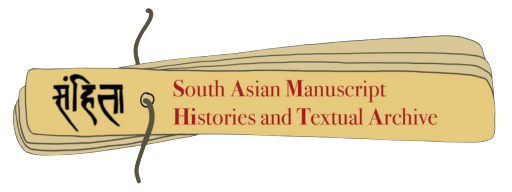Manuscripts
Search Filter
Saptapadārthī
ark:/12148/btv1b531609050 Language : Sanskrit Scripts : Devanagari
The text written by Śivāditya Miśra alias Śivāditya alias Vyomaśivādityācārya, son of Viśvanātha. This short treatise is among the earliest known works combining Nyāya and Vaiśeṣika. If the order of exposition of the text globally follows that of the Vaiśeṣika "categories" (padārtha), topics of epistemology are dealt with in some detail in the section on cognition (jñāna), one of the twenty-four qualities (guṇa). Śivāditya is also one of the first Vaiśeṣika authors to consider absence (abhāva) as a distinct category, a position originally typical of the Nyāya system.
Bhaktāmarastotravṛtti
ark:/12148/btv1b53148275c Language : Sanskrit Scripts : Devanagari
This is a Jain text which was written by Guṇākara. This is a commentary type text which is called Bhaktāmarastotravṛtti.
Yādavakulavarṇana
ark:/12148/btv1b53154012q Language : Sanskrit Scripts : Devanagari
The manuscript is dealing with clan of Yadu where Sri Krishna was born. The Yadava were an ancient Indian people who believed to be descended from Yadu. Jaya, Akṣobha, Stamita etc. so many ancestors were born in this clan. The clan is called Yādavakula. In this text Yādavakula family has been discussed.
Hitopadeśa, Mugdhabodhavyākaraṇa
ark:/12148/btv1b52502504q Language : Sanskrit Scripts : Devanagari
The manuscript has two texts. One is Hitopadesha and another one Mugdhobodhavyākaraṇa. Hitopadesha is an Indian text in the Sanskrit language consisting of fables with both animal and human characters. It incorporates maxims, worldly wisdom and advice on political affairs in simple, elegant language. The Hitopadesha is organized into four books, with a preface section called Prastavika. One of the important texts of the non-Paninian grammatical systems which was written by Mukundasaccidānanda.both animal and human characters. It incorporates maxims, worldly wisdom and advice on political affairs in simple, elegant language. The Hitopadesha is organized into four books, with a preface section called Prastavika.
Rāmāṣṭaka
ark:/12148/btv1b10020136k Language : Sanskrit Scripts : Devanagari
Rāmāṣṭaka is the eight verses of Rāma. This manuscript is illustrated.
Saptaśatibanda
ark:/12148/btv1b53157023m Language : Hindi Scripts : Devanagari
The manuscript is dealing with Saptaśatibanda where devi kills Chanda, Munda and other demons and spreads her own glory.
Pañcaśarābhidhānodāharaṇa
ark:/12148/btv1b531570225 Language : Sanskrit Scripts : Devanagari
The manuscript is dealing with astrology which is called Pañcaśarābhidhānodāharaṇa. In this manuscript birth and death related some problem are discussed. Some astrological charts have been drawn.
Mithyātakhaṇḍananāṭika
ark:/12148/btv1b53164709d Language : Hindi Scripts : Devanagari
It is a Jain text by Bakhtarāma (1764) which refers to the Digambar sect Terā-panth, started in the 17th century by a group of 13 people who distanced themselves from certain prevalent modes of worship.
Līlāvatīprakāśa
ark:/12148/btv1b105295962 Language : Sanskrit Scripts : Medieval Bengali
It appears to be a Vaiśeṣika text by Mahāmahopādhyāya Bṛddhamuni. The text discusses on Vaiśeṣika epistemology
Adhyātmopaniṣad (Yogaśāstra)
ark:/12148/btv1b53160896s Language : Sanskrit Scripts : Devanagari
The manuscript is related with Adhyātmopaniṣad which is called also Yogāśāstra. It is a Jain text. Hemacandra is the author of this text. There are twelve chapters. But in this manuscript 3rd and 4th prakāśa are discussed.
Vyatīpātamāhātmya
ark:/12148/btv1b531482113 Language : Sanskrit Scripts : Devanagari
Vyatīpātamāhātmya is a part of Skandapurāṇa. There are twenty-six verses in between Nārada and Brahmā.
Pramāṇanayatattvālokālaṃkara
ark:/12148/btv1b53148266d Language : Sanskrit Scripts : Devanagari
The manuscript is based on Nyāya philosophy. There are eight chapters where the basic concept of Nyāya philosophy is described. The section of the chapter is called pariccheda.













